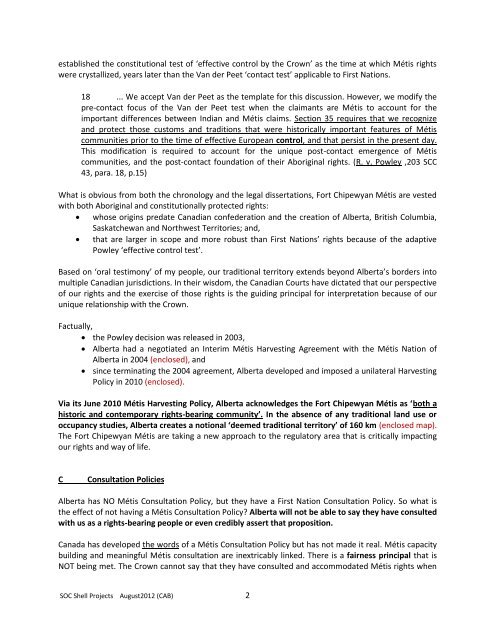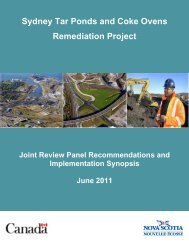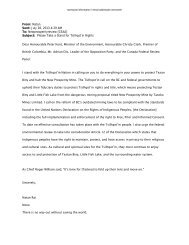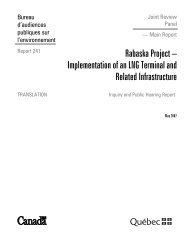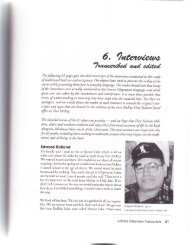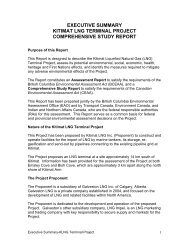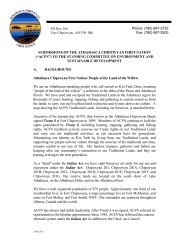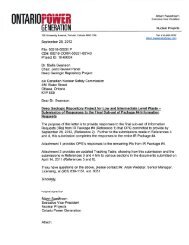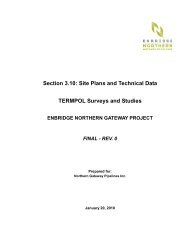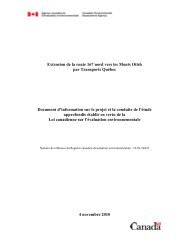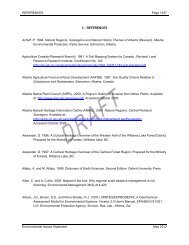Fort Chipewyan Métis Local 125 Métis Nation of Alberta PO Box 306 ...
Fort Chipewyan Métis Local 125 Métis Nation of Alberta PO Box 306 ...
Fort Chipewyan Métis Local 125 Métis Nation of Alberta PO Box 306 ...
You also want an ePaper? Increase the reach of your titles
YUMPU automatically turns print PDFs into web optimized ePapers that Google loves.
established the constitutional test <strong>of</strong> ‘effective control by the Crown’ as the time at which <strong>Métis</strong> rights<br />
were crystallized, years later than the Van der Peet ‘contact test’ applicable to First <strong>Nation</strong>s.<br />
18 ... We accept Van der Peet as the template for this discussion. However, we modify the<br />
pre-contact focus <strong>of</strong> the Van der Peet test when the claimants are <strong>Métis</strong> to account for the<br />
important differences between Indian and <strong>Métis</strong> claims. Section 35 requires that we recognize<br />
and protect those customs and traditions that were historically important features <strong>of</strong> <strong>Métis</strong><br />
communities prior to the time <strong>of</strong> effective European control, and that persist in the present day.<br />
This modification is required to account for the unique post-contact emergence <strong>of</strong> <strong>Métis</strong><br />
communities, and the post-contact foundation <strong>of</strong> their Aboriginal rights. (R. v. Powley ,203 SCC<br />
43, para. 18, p.15)<br />
What is obvious from both the chronology and the legal dissertations, <strong>Fort</strong> <strong>Chipewyan</strong> <strong>Métis</strong> are vested<br />
with both Aboriginal and constitutionally protected rights:<br />
whose origins predate Canadian confederation and the creation <strong>of</strong> <strong>Alberta</strong>, British Columbia,<br />
Saskatchewan and Northwest Territories; and,<br />
that are larger in scope and more robust than First <strong>Nation</strong>s’ rights because <strong>of</strong> the adaptive<br />
Powley ‘effective control test’.<br />
Based on ‘oral testimony’ <strong>of</strong> my people, our traditional territory extends beyond <strong>Alberta</strong>’s borders into<br />
multiple Canadian jurisdictions. In their wisdom, the Canadian Courts have dictated that our perspective<br />
<strong>of</strong> our rights and the exercise <strong>of</strong> those rights is the guiding principal for interpretation because <strong>of</strong> our<br />
unique relationship with the Crown.<br />
Factually,<br />
the Powley decision was released in 2003,<br />
<strong>Alberta</strong> had a negotiated an Interim <strong>Métis</strong> Harvesting Agreement with the <strong>Métis</strong> <strong>Nation</strong> <strong>of</strong><br />
<strong>Alberta</strong> in 2004 (enclosed), and<br />
since terminating the 2004 agreement, <strong>Alberta</strong> developed and imposed a unilateral Harvesting<br />
Policy in 2010 (enclosed).<br />
Via its June 2010 <strong>Métis</strong> Harvesting Policy, <strong>Alberta</strong> acknowledges the <strong>Fort</strong> <strong>Chipewyan</strong> <strong>Métis</strong> as ‘both a<br />
historic and contemporary rights-bearing community’. In the absence <strong>of</strong> any traditional land use or<br />
occupancy studies, <strong>Alberta</strong> creates a notional ‘deemed traditional territory’ <strong>of</strong> 160 km (enclosed map).<br />
The <strong>Fort</strong> <strong>Chipewyan</strong> <strong>Métis</strong> are taking a new approach to the regulatory area that is critically impacting<br />
our rights and way <strong>of</strong> life.<br />
C Consultation Policies<br />
<strong>Alberta</strong> has NO <strong>Métis</strong> Consultation Policy, but they have a First <strong>Nation</strong> Consultation Policy. So what is<br />
the effect <strong>of</strong> not having a <strong>Métis</strong> Consultation Policy? <strong>Alberta</strong> will not be able to say they have consulted<br />
with us as a rights-bearing people or even credibly assert that proposition.<br />
Canada has developed the words <strong>of</strong> a <strong>Métis</strong> Consultation Policy but has not made it real. <strong>Métis</strong> capacity<br />
building and meaningful <strong>Métis</strong> consultation are inextricably linked. There is a fairness principal that is<br />
NOT being met. The Crown cannot say that they have consulted and accommodated <strong>Métis</strong> rights when<br />
SOC Shell Projects August2012 (CAB) 2


